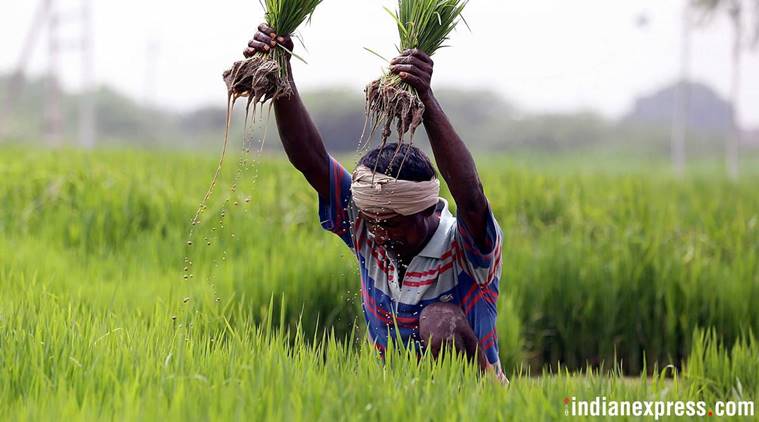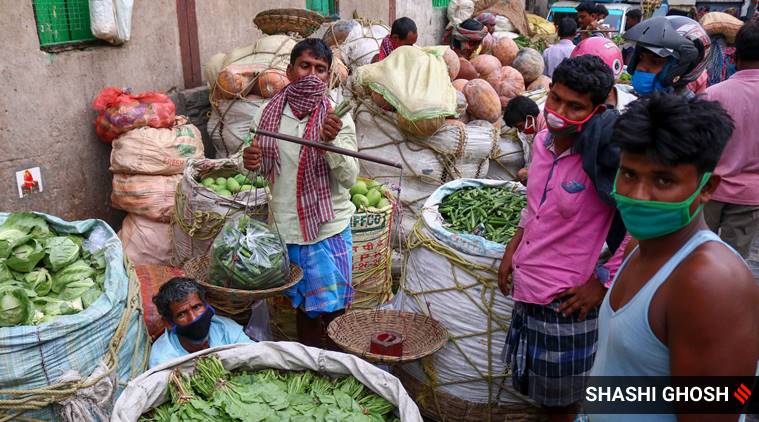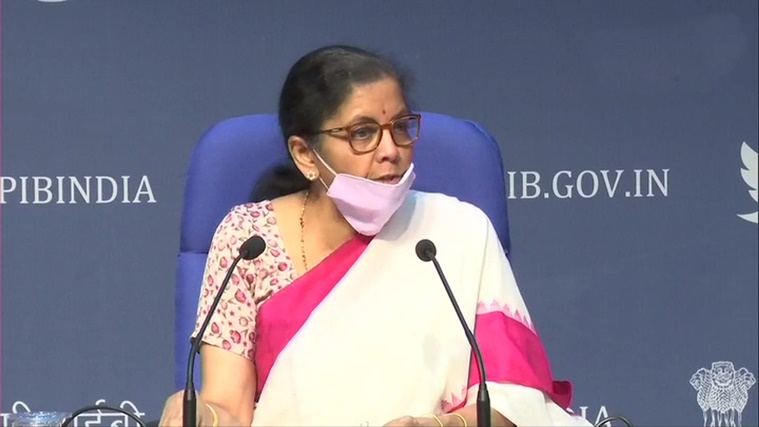Out of the 11 announcements, three concern governance and administrative reforms, including amendment of the Essential Commodities Act (ECA), 1955, and agriculture marketing reforms through a Central law. These have been part of successive Union Budgets under the Modi government.

Follow coronavirus LIVE updates
Sitharaman also announced the setting up of a Rs 1 lakh crore Agri Infrastructure Fund; the formalisation of Micro Food Enterprises, with an outlay of Rs 10,000 crore; a vaccination drive against food and mouth disease among cattle; extension of the Operation Greens from tomatoes, onion and potatoes to all fruits and vegetables; help for fishermen through the Pradhan Mantri Matsya Sampada Yojana; a Rs 15,000-crore Animal Husbandry Infrastructure Development Fund; Rs 4,000 crore for promotion of herbal cultivation; and a Rs 500 crore scheme to promote beekeeping.
Many of these schemes have again been part of the Modi government’s earlier promises.
While presenting her first Budget as Finance Minister, on July 5, 2019, Sitharaman had said, “The Agricultural Produce Marketing Committee (APMC) Act should not hamper farmers from getting a fair price for their produce.”
 Express Cartoon by EP Unny.
Express Cartoon by EP Unny.
Earlier, Arun Jaitley as finance minister had repeatedly stressed the need for reforms in the APMC Act. In his first Budget speech, on July 10, 2014, the late BJP leader had said, “To accelerate setting up of a national market, the Central government will work closely with the state governments to re-orient their respective APMC Acts, to provide for establishment of private market yards/private markets. The state governments will also be encouraged to develop farmers’ markets in town areas to enable the farmers to sell their produce directly.”
Read | Freeing up the farmer: Govt to ease curbs on trade, open up markets
Story continues below this ad
In his 2016-17 Budget speech, Jaitley had raised the same again, saying, “Access to markets is critical for income of farmers. The government is implementing the Unified Agriculture Marketing Scheme which envisages a common e-market platform that will be deployed in 585 regulated wholesale markets. Amendments to the APMC Acts of states are a pre-requisite. I am happy to inform that 12 states… are ready to come on board.”
 A wholesale vegetable market in Kolkata, Friday. (Express photo by Shashi Ghosh)
A wholesale vegetable market in Kolkata, Friday. (Express photo by Shashi Ghosh)
The matter had been raised by him again in his next year’s Budget speech, saying, “Market reforms will be undertaken and states would be urged to denotify perishables from the APMC.”
Prime Minister Narendra Modi had raised the issue during the Governing Council Meeting of the NITI Aayog on June 15, 2019, seeking “foundational reforms in the agri-economy”. The meeting’s core agenda was “the need to review the implementation of the APMC Act and possible reform… as well as exploring changes in the Essential Commodities Act”.
Expert Explains: Lockdown-unlockdown debate
Similarly, the Economic Survey 2019-20, presented to Parliament on January 31 this year, recommended the scrapping of the ECA.
Story continues below this ad
The scheme concerning foot and mouth disease already exists under the National Animal Disease Control Programme, which was launched by the PM on September 11, 2019, with an outlay of Rs 12,652 crore till 2024. Sitharaman had mentioned the scheme in her Budget speech on February 1 this year, setting aside Rs 13,000 crore for it, saying, “Our government intends to eliminate foot and mouth disease, brucellosis in cattle and also peste des petits ruminants in sheep and goat by 2025.”
The extension of Operation Greens to all fruits and vegetables was first announced by Jaitley as finance minister in his 2018-19 Budget speech, on February 1, 2018. Promising Rs 500 crore for ‘Operation Greens’ on the lines of ‘Operation Flood’, Jaitley had said, “Operation Greens shall promote Farmer Producers Organisations, agri-logistics, processing facilities and professional management.”
 Finance Minister Nirmala Sitharaman during her press conference.
Finance Minister Nirmala Sitharaman during her press conference.
The Pradhan Mantri Matsya Sampada Yojana covering fishermen was part of Budget 2019-20, presented on July 5 last year. In her speech at the time, Sitharaman had said, “Through (the) scheme, the Department of Fisheries will establish a robust fisheries management framework. This will address critical gaps in the value chain, including infrastructure, modernisation, traceability, production, productivity, post-harvest management, and quality control.”
Read | Oppn states not clearing migrant trains, says Centre; they hit back
Story continues below this ad
Under the Rs 4,000 crore herbal cultivation plans, the National Medicinal Plants Board will grow medicinal plants on 800 hectares along the banks of the Ganga. The beekeeping scheme is aimed to benefit two lakh apiary developers.

 Sitharaman also announced the setting up of a Rs 1 lakh crore Agri Infrastructure Fund; the formalisation of Micro Food Enterprises, with an outlay of Rs 10,000 crore
Sitharaman also announced the setting up of a Rs 1 lakh crore Agri Infrastructure Fund; the formalisation of Micro Food Enterprises, with an outlay of Rs 10,000 crore
 Express Cartoon by EP Unny.
Express Cartoon by EP Unny. A wholesale vegetable market in
A wholesale vegetable market in  Finance Minister Nirmala Sitharaman during her press conference.
Finance Minister Nirmala Sitharaman during her press conference.





